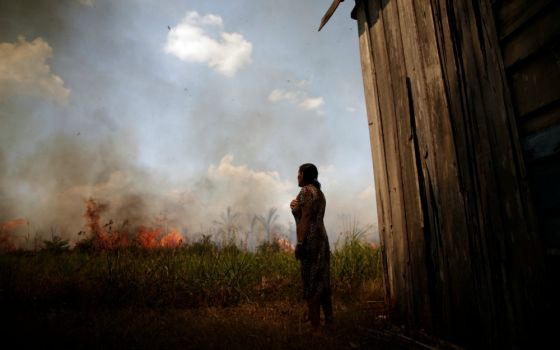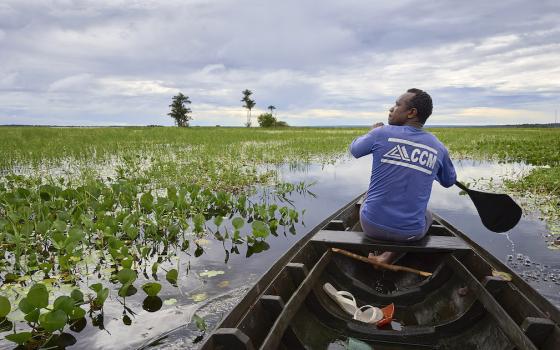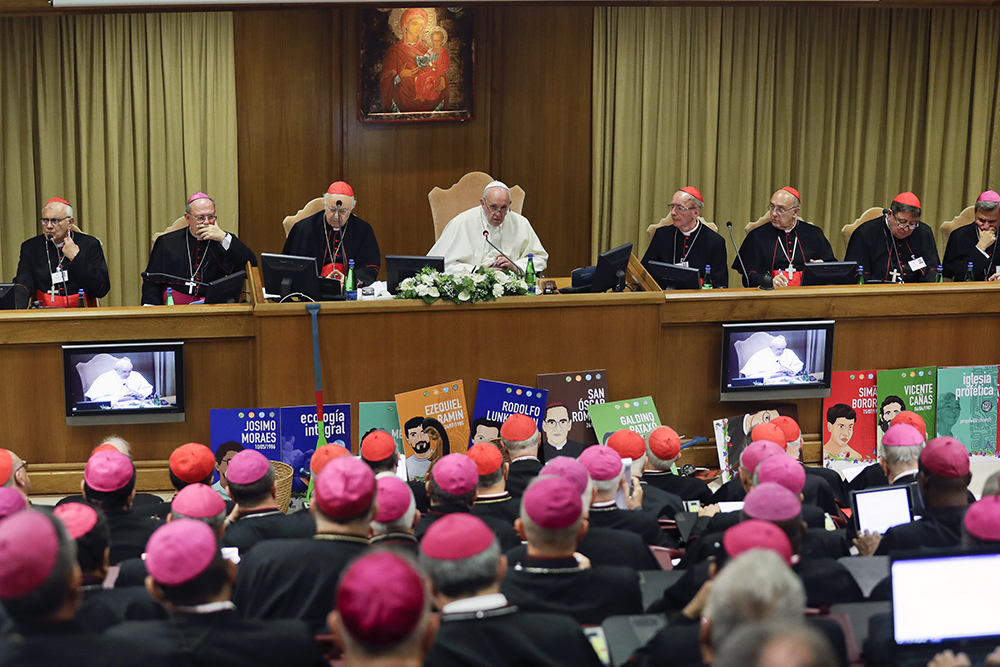
Pope Francis speaks during the opening session of the Amazon synod at the Vatican on Oct. 7, 2019. (AP/Andrew Medichini)
The synod of bishops meeting in Rome appears to be moving toward recommending the ordination of married men in the Amazon region.
While no one can predict what the bishops will do, one Brazilian bishop recently estimated that two-thirds of the bishops at the synod will support ordaining "viri probati" — a church phrase meaning "married men of proven virtue."
Another participant told Religion News Service that only a couple of the 185 bishops spoke against the idea during the first week of the synod.
The three-week synod, which began Oct. 6, is composed mostly of bishops from the Amazon region but includes laity and religious, both men and women, as nonvoting participants. Among the lay participants are indigenous people from the area.
The first week of the synod involved three days of four-minute speeches by the participants, followed by two days of small group discussions. The second week has two days of speeches, followed by another two days of small group discussions. Rumor has it that the synod will get Friday off while a committee attempts to draft recommendations that reflect the consensus of the synod. Next week, the final week, will be decision time, when the bishops will vote on the recommendations they want to make to the pope.
Advertisement
Some bishops have complained about the Western media's singular focus on the question of married priests, pointing to the other critical issues that have been discussed, such as the destruction of the Amazon rainforest and its impact on biodiversity, environmental pollution and climate change, all of which has benefited the rich, said the bishops.
The wholesale violation of the human rights of indigenous peoples has also been decried. Thousands have been slaughtered and more have been displaced from territories that have been occupied by their ancestors for centuries.
But the ordination of married men has been a recurring topic at the synod.
Those participating in the meetings do not approach the issue from an ideological perspective. There has been no talk of the "right" of priests to marry or that celibacy is a bad idea. No one is advocating letting already ordained men marry; rather they propose allowing the ordination of men who are already married.
The approach of those in favor has been pragmatic. If the Eucharist and the sacraments are essential to a Catholic community, they say, then the communities need priests. If there are not enough celibate priests, then the church needs to ordain married men.
One Amazonian bishop explained that he had so few priests that it would be like Italy having only 25 priests to serve all its Catholics. Other bishops talked of villages that celebrate the Eucharist at most only two or three times a year. Those supporting the ordination of married men say the priest should not just be a visitor, but a permanent presence in the community.
But it is not just isolated villages that lack priests. Bishop Carlo Verzeletti, who oversees the Diocese of Castanhal, near Belém, in northern Brazil, noted that he has a city with 150 Pentecostal churches, while Catholics have only 50 churches due to the shortage of clergy. Often people attend a Pentecostal church because it is the only place to worship in their village or their neighborhood.
But allowing married priests is only part of the solution. Many bishops spoke of the importance of good training and formation for lay and clerical leaders.
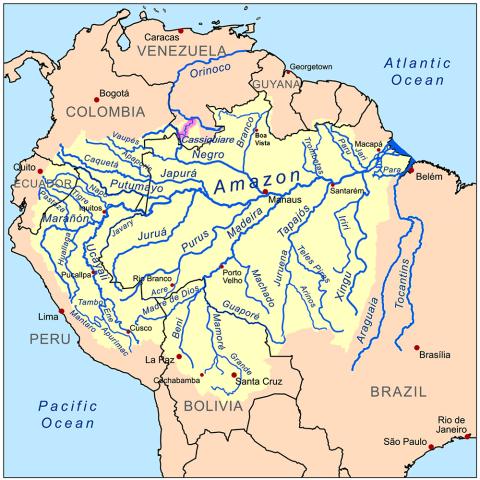
The Amazon River Basin in South America. (RNS/courtesy of Creative Commons)
One approach would be to find local lay leaders, train them and then ordain them for their communities. Another would be to recruit and train a cadre of married men who would be missioned to communities that need priests. Both approaches would probably be needed.
Good training is essential for all priests, but especially those sent into communities currently led by women, where there is a danger the new priest will push the women leaders aside. Such clericalism is as much a temptation for married priests as it is for celibate priests.
Sister Gloria Liliana Franco Echeverri, president of the Latin American and Caribbean Confederation of Religious, spoke of the importance of priestly formation that trained men to work in teams with others.
Training brings its own set of questions. Bishops from poor dioceses wonder how they would pay for it and suggested pooling educational and financial resources. They also expressed concerns about how married ordained men’s families would be supported financially.
Although most of the bishops, including the pope, seem to consider the ordination of married men an exception for the Amazon region, many outside the synod believe it will be hard to contain once it is established there.
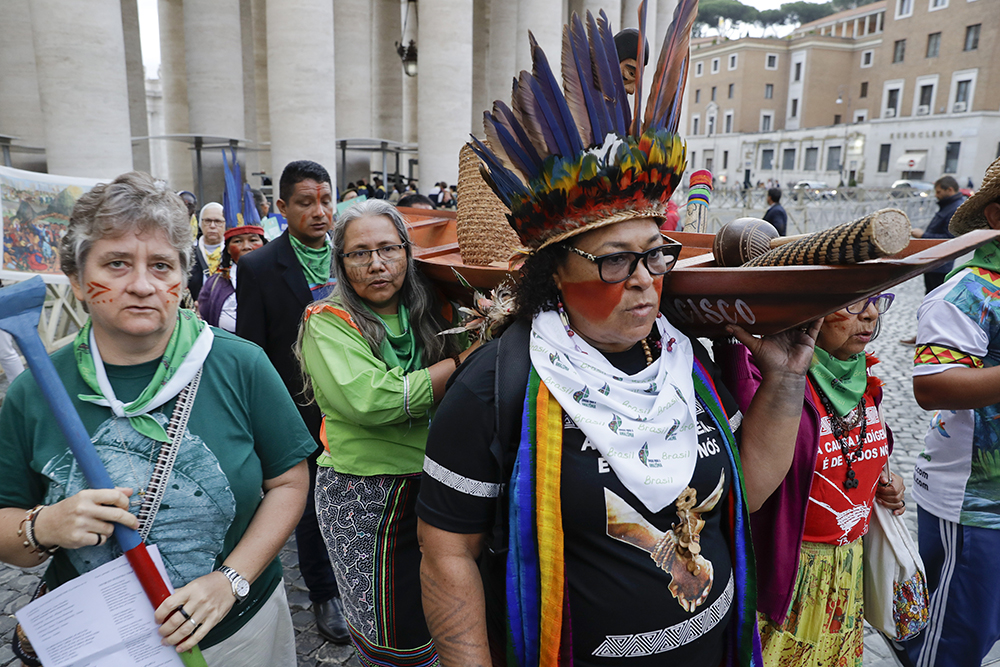
Participants in the Amazon synod arrive in St. Peter’s Square at the Vatican on Oct. 7, 2019. (AP/Andrew Medichini)
There are, however, examples of married priests in the Catholic Church. The Eastern rite churches have allowed married priests for centuries. In the United States, married Lutheran and Episcopal priests who have taken Catholic orders have been allowed to continue their ministries. These practices have not led to further expansion of married clergy.
On the other hand, the Amazon is hardly the only place in the world where the Catholic Church needs more priests. If the pope allows married priests in the Amazon, how will he say no to the bishops of another region or nation who request it?
And if married priesthood becomes an option, how many young men will choose it over celibacy? Many seminarians see celibacy not as an intrinsic value but simply part of the price of becoming a priest. Given the choice, they will choose marriage.
If the synod recommends the ordination of married men that will not be the end of the debate. The pope will probably consult with other bishops around the world before he makes a decision. And even if he says yes, selecting, training and supporting these men will be a challenge for the Amazon church.
This is new territory for the Catholic Church, and it would be wise for it to look to Protestant and Orthodox churches that have been dealing with these issues for a long time.
[Jesuit Fr. Thomas Reese is a columnist for Religion News Service and author of Inside the Vatican: The Politics and Organization of the Catholic Church.]
Editor's note: You can sign up to receive an email every time a new Signs of the Times column is posted. Sign up here.








